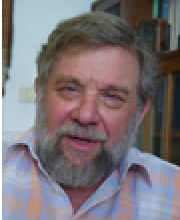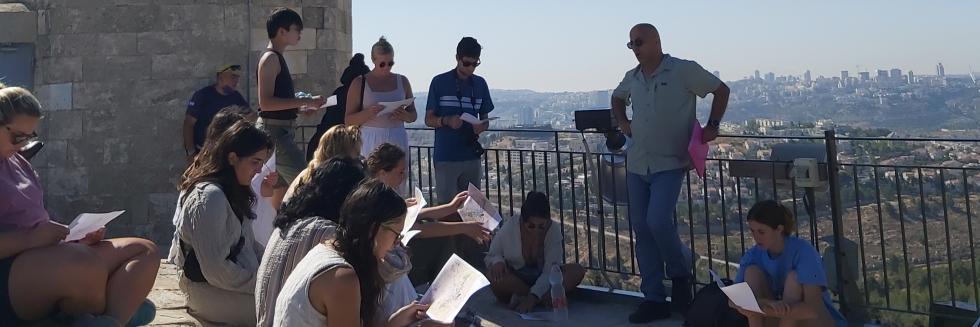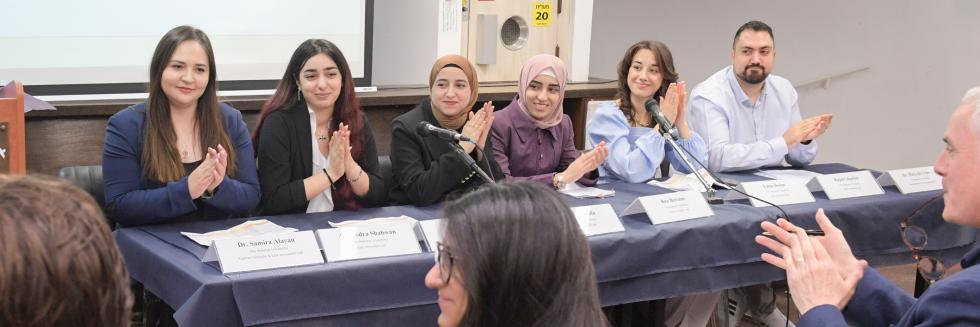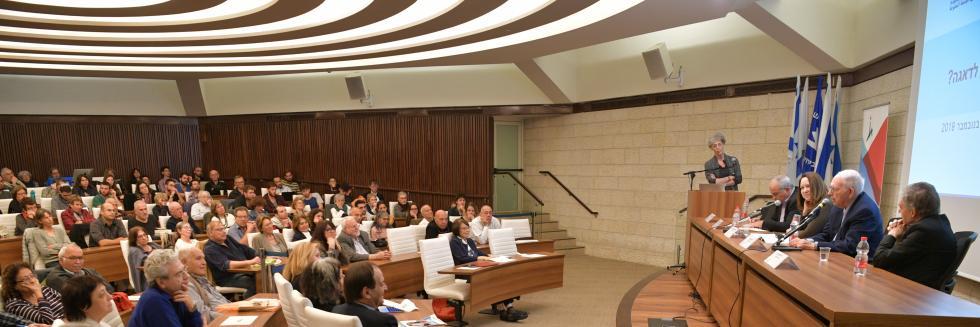Mr. Gideon Remez
Areas of Expertise: USSR/Russia in Middle East, USSR/Russia and Arab-Israeli Conflict, Cold War

Gideon Remez was born in Tel Aviv on June 2, 1946. He served in the Israel Army Paratroops from 1964 to ’66; on reserve duty, he saw combat on the Golan Heights in the 1967 Six-Day War and later in the Jordan Valley, and was a front-line reporter from the Suez Canal theater of the 1973 Yom Kippur War.
Following a Bachelor’s degree in Hebrew Linguistics and Literature and in Philosophy from the Hebrew University of Jerusalem (’73), Remez received a Master’s degree in History of American Civilization (’78) from Brandeis University, Massachusetts. After retiring from radio journalism in 2003, he joined the research project initiated by Dr. Isabella Ginor of the Truman Institute at the Hebrew University on the Soviet military involvement in the Arab-Israeli conflict. He was formally appointed a research fellow of the Institute as of academic year 2009; since a change in the institute’s terminology in 2014, his title is Associate Fellow, with no change in status.
Remez was for some 36 years a journalist with Kol Israel (Voice of Israel, the national radio network of the Israel Broadcasting Authority), serving as a newswriter, Parliamentary Correspondent, Head of the Current Affairs Department and Executive Editor in the central newsroom. During leaves of absence, he was also Press Relations Manager for Israel Aircraft Industries Ltd. (1970-72) and Staff Correspondent for The Jerusalem Post (1972). He is a regular contributor to broadcast and print media in the United States, Israel, Europe and Australia, and a frequent lecturer in Israel and abroad. In 2003-2005, he taught news broadcasting at Sapir Academic College in Sderot, southern Israel.
From 1982 until his retirement, Remez was Head of Kol Israel's Foreign News Desk. In 1991 he originated, as editor/presenter, The International Hour, the first daily program in the Israeli media devoted entirely to foreign affairs, specializing in interviews with newsmakers worldwide and real-time reporting of breaking news. Remez also produced and anchored widely acclaimed live coverage of such events as the Romanian revolution of 1989, the 1991 and 1993 coup attempts in Moscow, and every American presidential election from 1980 to 2000, when his broadcast’s prediction of a tie in the electoral college was among the closest made anywhere. His world exclusives included the first interview with Andrei Sakharov over the phone installed to inform the Soviet dissident that he could return from internal exile; and (after a long struggle with Israeli censorship) Fidel Castro’s permission for Cuban Jews to emigrate to Israel. On 11 September 2001, he was on air when the first hijacked airliner hit the World Trade Center and was the first to conclude, within minutes, that this was a "kamikaze attack."
In recognition of these achievements, Remez received the Nahum Sokolov Award (“Israeli Pulitzer Prize”) for broadcast journalism (1993); the Joint Distribution Committee’s Boris Smolar Award for coverage of Israel-Diaspora relations (1999) and a citation from the B’nai B’rith Wolf Matsdorf Journalism Awards (2000).
Academic publications, co-authored with Dr. GinorBooks:
- Foxbats over Dimona: The Soviets' Nuclear Gamble in the Six-Day War (Yale University Press, 2007); Silver Medal, Book Prize of the Washington Institute for Near East Policy and a Book of the Year in military history, Foreign Affairs journal, 2008.
- The Soviet-Israeli War, 1967-1973: The USSR’s Military Intervention in the Egyptian-Israeli Conflict (forthcoming from Hurst (UK) and Oxford University Press (USA), June 2016.
Book chapters:
- "The Origins of a Misnomer: The 'Expulsion of Soviet Advisers' from Egypt in 1972," in Nigel Ashton (ed.), The Cold War in the Middle East: Regional Conflict and the Superpowers 1967-73, London: Routledge-LSE, 2007.
- “The USSR Sets Precedents: Military Involvement and Nuclear Threat in the 1956 Crisis” (Hebrew). Paper presented in a conference at Haifa University, November 2006, forthcoming in a book of the proceedings.
- "The Middle Eastern test of Detente: The USSR’s direct role in the Yom Kippur War, 1973," in Antonio Varsori et al., eds., Détente in Cold War Europe: Politics and Diplomacy in the Mediterranean and the Middle East .London: I.B. Tauris, 2016.
- “Israel’s Best Spy or a Master Double Agent? New Light from the Soviet Angle on the Mystery of Ashraf Marwan” (paper presented at a conference in Greifswald University, Germany, 2015), forthcoming in Need to Know: The Human Element, University of Southern Denmark Press, 2016.
- “The KGB’s Abduction Program and the PFLP: New Evidence,” paper presented in a conference at the Institute of Graduate Studies, Geneva, April 2015; forthcoming in States and Terrorism in the Cold War: Myth and Reality, Washington: International Center for Terrorism Studies, 2017
Scholarly-journal papers:
-
"Un-Finnished Business: Archival Evidence Exposes the Diplomatic Aspect of the USSR's Pre-Planning for the Six-Day War," Cold War History 6:3 (2006)."The Spymaster, the Communist, and Foxbats over Dimona: The Motive for the USSR's Instigation of the Six-Day War," Israel Studies 11:2 (2006).
- "The Six-Day War as a Soviet Initiative: New Evidence and Methodological Issues," MERIA 12:3 (2008) http://www.gloria-center.org/2008/09/remez-2008-09-02/
- "The Tyranny of Vested-Interest Sources: Shaping the Record of Soviet Intervention in the Egyptian-Israeli Conflict, 1967–1973," Journal of the Middle East and Africa 1:1 (2010).
- "A Cold War Casualty in Jerusalem, 1948: The Assassination of Witold Hulanicki," Israel Journal of Foreign Affairs 4:3 (2010).
- “Too Little, Too Late: The CIA and US Counteraction of the Soviet Initiative in the Six-Day War,” paper presented at NSA Cryptological conference, 2009; Intelligence and National Security 26:2-3 (2011); Honorable mention, Virginia Military Institute Cold War Essay Competition, 2010.
- "Her Son, the Atomic Scientist: Mirra Birens, Yuli Khariton and Max Eitingon's Services for the Soviets," Journal of Modern Jewish Studies, 11:1 (2012).
- “Gipotezy stanovyatsya vyvodami: novoye o Makse Eitingone i ego svyazyakh s Sovetskim Soyuzom,” (Russian: “Hypotheses Become Conclusions: New Findings about Max Eitingon and his Links with the Soviet Union”), Neprikosnovenny Zapas (Moscow), #91, May 2013. http://www.nlobooks.ru/node/4016
- “’Meine Mirra, meine Welt’: Mirra Birens-Eitingon als Schlüssel zur Persönlichkeit ihres Mannes Max Eitingon” (German: “’My Mirra, my World’: Mirra Birens-Eitingon as a Key to Her Husband Max Eitingon’s Persona,” Luzifer-Amor (Berlin) 28:1 (2015).
- "Veterans’ Memoirs as a Source for the USSR’s Intervention in the Arab-Israeli Conflict: The Fluctuations in Their Appearance and Character With Political Change in Post-Soviet Russia," combining presentations made at two international conferences in 2014: "Looking at Then, Now" at the Hebrew University of Jerusalem and "Cold War Narratives" at the University of Lausanne. Slavic Military Studies 29:2 (2016).
- “The KGB’s Abduction Program and the PFLP: On the Cusp between Intelligence and Terrorism,” paper presented in a conference at the Institute of Graduate Studies, Geneva, April 2015; forthcoming in Terrorism: An Electronic Journal and Knowledge Base 6:1 (2017).





